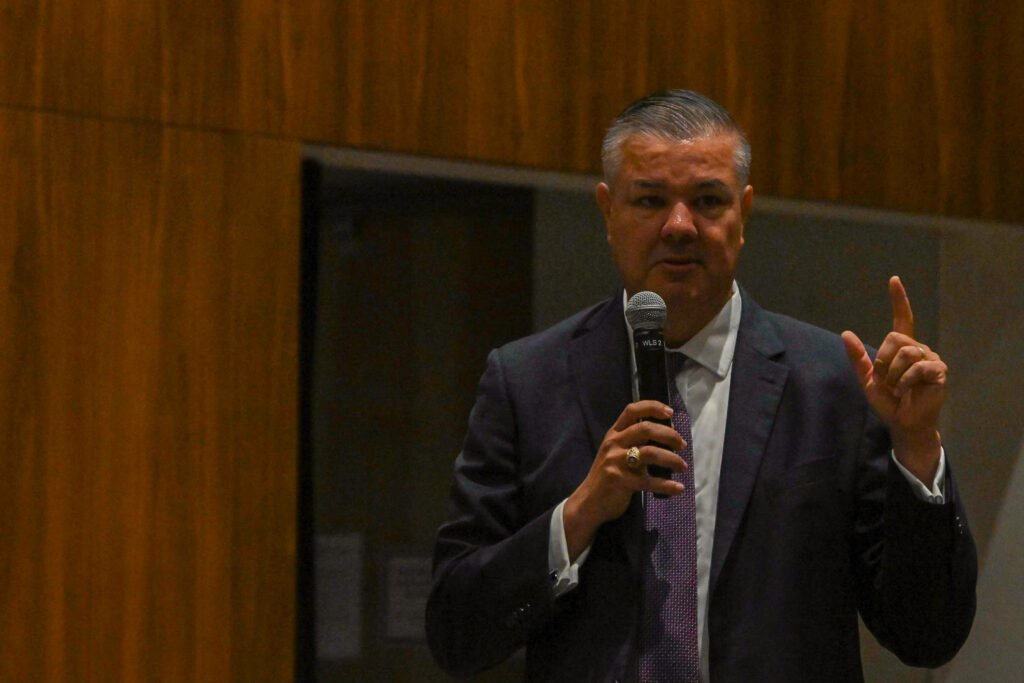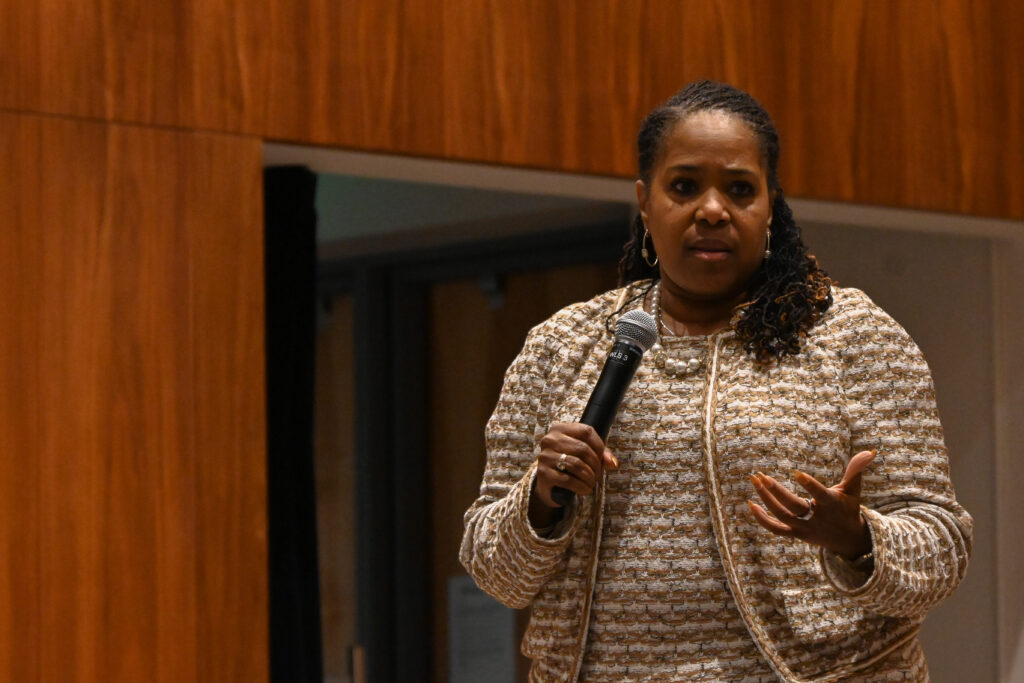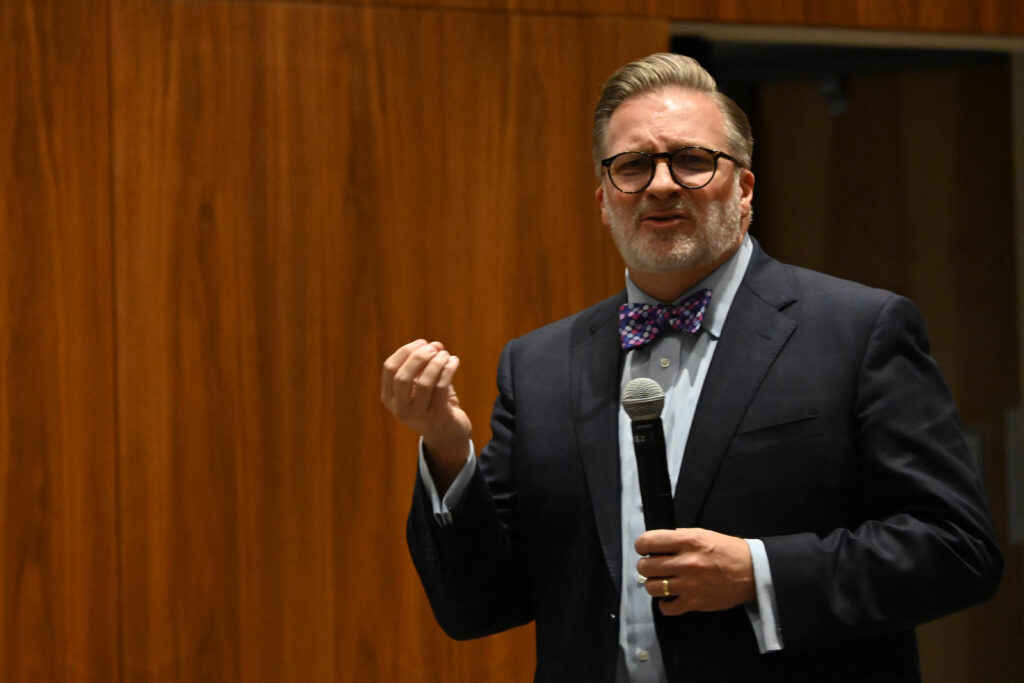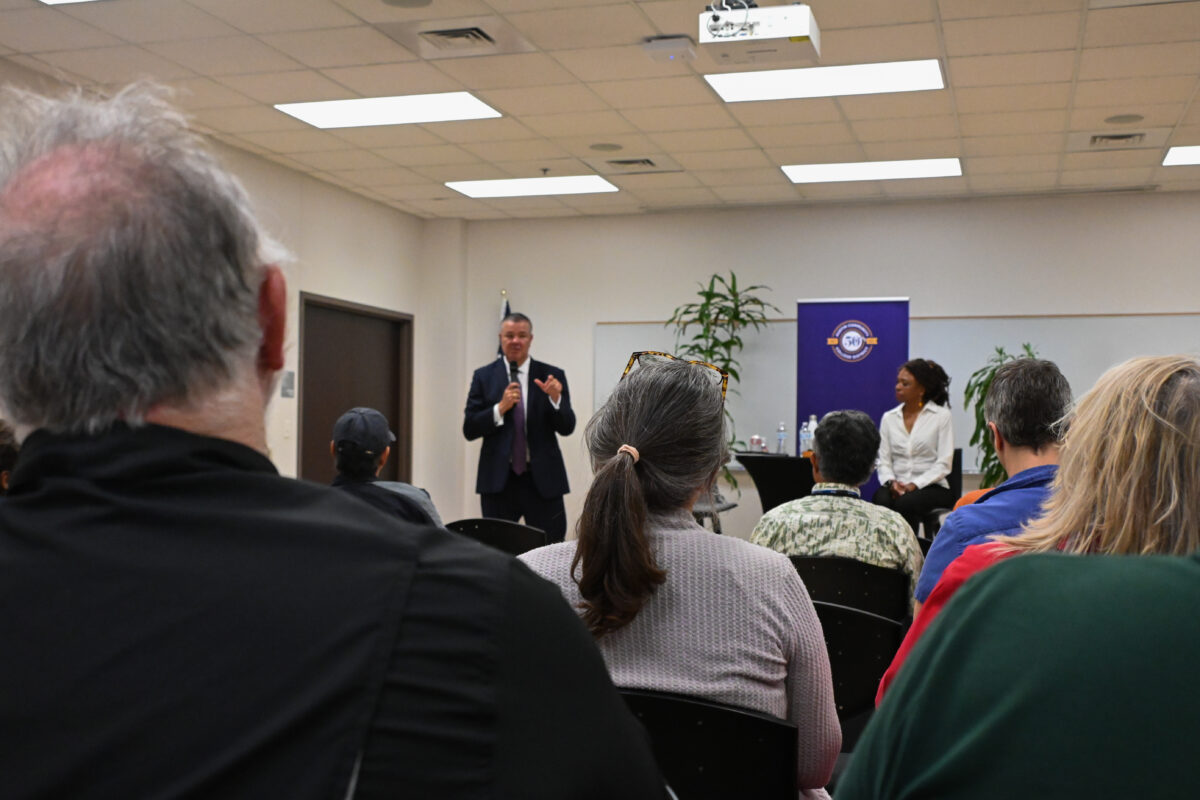By Nathan Adam Spear
In its 50th year, ACC is already nearing the final stages of its first middle-aged major change. Announced in an email to students, staff and faculty on June 16 was an invitation to meet the three top candidates to succeed Dr. Richard Rhodes in the role of ACC’s supreme position, the Chancellor.
The candidates – Dr. Robert Garza, Dr. Joyce Ester and Dr. Russell Lowery-Hart – have been highlighted as top choices for the position by the selection committee formed after Rhodes announced his departure in January, expressing love for the school but a desire for more time with his family.
The school’s chancellor – or to put it a little less ‘Star Wars’, the president/CEO – works under ACC’s board of trustees, leading the college district in essentially all major decisions. Understandably, this makes the transition to a new chancellor a pretty big priority for the school and board, with Rhodes’ impressive and record-breaking 12 year tenure coming to an end.
The task of selecting someone to fill these shoes has been put in control of the aptly named Chancellor Search Advisory Committee. A 35 person team composed primarily of community members and ACC’s board of trustees, as well as various associations made up of administration, faculty and two ACC students.
“What I’m looking for is a relational leader who thinks and acts systemically to address the challenges of ACC and builds off our successes,” said Dr. Barbara Mink, sharing her notes for the board of trustees after hosting all three days of the candidates’ Q&A forums at Round Rock and Highland.
As Chair of the Board of Trustees, Mink is a member of the search advisory committee and has been an active part throughout this nearly six-month long search process. Far from her first chancellor-picking rodeo however, Mink joined the board in 2000, and was originally hired as a dean for the school in 1973 – ACC’s first year of existence.
The Board Chair says that right now, the school could use a chancellor focused on, “internal housekeeping.”
Mink and the rest of the board organized a whole day’s worth of open-invite Q&As at three different ACC campuses for each of the candidates.
“It’s Austin, people want to be involved,” said Mink, describing the importance of community forums in the search process. Starting up north with a session in Round Rock, each candidate on their respective day had to then travel south for two more stops at Highland and then finally, the South Austin campus.
Although it’s a busy schedule – and not to mention over 50 miles worth of travel – Mink says that’s probably a good thing for the future president of (currently) 11 campuses to be getting used to.
As each session began to accumulate a size-able and outspoken crowd, some perspective on the chancellor’s importance to the ACC community was given along with the memory of a time before the pandemic.
Several members of the board and selection committee made appearances; the Sociology Department Chair, Rennison Lalgee, had even referred to the event as a, “who’s-who,” of ACC faculty and staff as he arrived with his colleagues at the recital hall in the Highland campus.

Robert Garza
The first day of forums introduced Robert Garza to the three campus audiences. Since 2018, Garza has been serving as Palo Alto College’s seventh president. Having around 30 years of experience in higher education, he first began working for the Alamo College District, which PAC is a part of, in 1999 before moving to Dallas College as the president of their Mountain View campus in 2015.
In his hour of speaking, guided by approved questions from the search committee before taking questions from the audience, Garza made an initial point to learn who it was he was speaking to. Asking for a show of hands, he found in attendance at the Highland Q&A was a large amount of staff, a bit less faculty and only one enrolled student (me, but several more hands went up once alumni were included).
The largely framed but seemingly kind-hearted candidate had a familiar Texas accent and adopted a salesman-like approach to his answers – including light relatable humor, personal history and even a few rhetorical questions too, like: “Who thinks it’s easy to go to college nowadays?” or, “Is anybody a parent?”
Similar to his previous employment, Garza’s academic history is Texas-centered as well. With a master’s in public administration from UTSA and both a doctorate in educational administration and the V. Ray Cardozier Alumni Excellence Award from UT; it was the bachelor’s degree from A&M in College Station that got a small “woo!” from someone in the crowd.
By describing some of his previous leadership initiatives, he stressed his strengths of collaboration and effective communication with both students and employees as the proper tools for leading the school.
“A chancellor is only one person, I can not say this enough,” worded Garza, “it will take everybody in this room and everybody who is not in this room to work together to help our students be successful in every possible way.”
Garza places priority in reaching out for feedback to target issues directly, and says to do that he currently hosts routine meetings with associations like his school’s staff and faculty senate. He also described his frequent “Whataburger with the president” days where he shares a meal at the famous Texas fast food chain with students or an organization while sporting his Whataburger guayabera.
Garza also has experience in collaboration outside of the school as well; as an example he referred to Alamo College’s involvement with 23 school districts for dual-enrollment programs and AlamoPromise which gives free tuition to students from participating local high schools.
Also during his tenure, negotiations with a nearby Toyota manufacturing site led to securing a work-study program between the under-staffed plant and Alamo Colleges.
“They donate equipment, they donate money and they hire our students.” Says Garza, acknowledging the importance of outside partnerships.
Though his authority is limited to Palo Alto College’s one campus, Garza assures that the increase in size at ACC won’t be a totally new experience. The Alamo Colleges are the state’s only current multi-college system, he says, meaning the need to travel and balance multiple locations makes it a similar experience to the multi-campus system here at ACC.
Perhaps due to his awareness of the audience’s demographic, Garza’s desire to increase employee morale was largely emphasized throughout the session. He advocated for hybrid (online and in-person) work days, and mentioned the one hour a week that his current employees get for on the clock “self-care”.
“You know as well as I do that folks are doing it anyway,” he says, “I don’t want them feeling bad about it.”
Wanting to expand appreciation for the staff as well, the candidate mentioned his current school’s history of honoring good work by planting trees and devoting plaques to outstanding individuals.
“She has worked here for 50 years!” He said, referring to a woman he spoke with earlier who was now in the audience, “What are we going to do to remember her?”
The room filled with laughter after she quickly responded with her own idea of, “More than a plaque!”
Garza has heavy pride in his Hispanic heritage and is even Board Chair for the Mexican-American Civil Rights Institute, a national organization which he says has a museum opening in San Antonio.
Even with this cultural pride, Garza emphasizes that, “People are who we need to be supporting, it doesn’t matter what language you speak or what you look like, we’re all human beings.”
Before adding, “I mean, I haven’t met a robot yet.”

Joyce Ester
Garza’s three forums seemed like a tough act to follow; the person to do it was top candidate and fifth president of Normandale Community College (NCC), Joyce Ester.
In front of a very similar audience to yesterday’s, but at a much quicker pace than Garza’s slightly long-winded points, Joyce Ester introduced herself as having over 30 years experience in higher education – but only after first sharing her story.
“Serving as president – or in this case, chancellor – is what I do, not who I am,” she says, “and who I am is a child of a single mom.” Understanding the many obstacles that can come in the way of academic success, she says this part of her identity is important for students to know and connect with more easily.
There are several differences between Ester and her fellow candidates, the obvious two being that she is both African-American and a woman; but a less clear distinction, yet a more important one for some, is that she is the only choice from outside of Texas.
Her academic history, a Ph.D. in Education from the University of California in Santa Barbara and a B.A. in Sociology from Northern Illinois University, led to several faculty and staff positions in California before holding the position of president at both Kennedy-King College in Chicago and later at NCC in Bloomington, Minnesota.
The audience seemed to like her despite the lack of Texas experience – especially after her comparison of a Minnesota native saying, “that’s interesting,” to the Texas equivalent she learned about recently, “bless your heart.”
Not Texan, but she does have experience with large school systems. NCC is the biggest college in Minnesota, and only one of the 30 state colleges and seven universities that comprise the Minnesota State system – all of which are handled by one board and a chancellor.
“It’s really important to look at what our policies and procedures are.” Says Ester, adding that avidly reviewing and renewing policies is another goal she would take on as chancellor, “For many student’s the problem is that we made policies that maybe made sense five to ten years ago that we need to take another look at.”
Similar to Garza; First, knowing the specifics of a problem to advocate for creative solutions is Ester’s strategy for addressing the needs of a community. Due to ACC’s size and diverse needs, she assures that lots of time and the beginning of her tenure would focus on learning and understanding each campus.
She adds that it is important for her to know every campus’ “Jerry,” – a hypothetical person she explains is involved with the school and knowledgeable about its niche details. “[Jerry] knows where all the bodies are buried, and who put them there.”
One example of her history with using data to target change, she highlights, is NCC’s establishment of the “campus cupboard”.
It was started with only small sustaining snacks, but after acknowledging that around half of the college’s students reported feeling “food insecure”, the “cupboard” – which is actually around the size of a classroom – grew to include basic groceries and even hygiene items at no cost to students.
She also mentions an initiative taken at NCC to continue providing resources for students while also keeping the Maintenance and Operations department employed during the pandemic. While they weren’t needed at the schools, the worker’s in the department switched to food delivery for food insecure students.
“That was something that came from them,” Ester admits, “but I think my responsibility as a leader then was to empower them, to help them think outside the box and be a part of that process.”
She had a tendency to speak quickly; seeming almost out-of-breath at the beginning of her speech, the audience laughed when she worded a playful apology to the ASL interpreter for her pace – feeling guilty from her history working as an interpreter herself and teaching the subject as an adjunct professor.
With significantly more time to ask their own, the larger audience than the day before likely wasn’t too upset about the speed she got through the initial questions.
Some of the concerns regarded handling conflict and the importance of employee wellness. The audience seemed satisfied with her answers of, “[handle] conflict before it becomes a major conflict,” and, “We can’t take care of students, if we don’t take care of ourselves.”
Ester was also asked about her experience with a performance-based funding model, she denied having any but says she understands its existence, relating it to a car dealership saying, “if you’re not selling enough cars, then you’re not working here.”
She says that establishing better “metrics” for a student’s post-performance is important when not using an enrollment-based model, with credits at a community college often leading to multiple avenues beyond just graduating.
After a long history in the field of education, Ester’s retention of energy and passion for the job was evident and encouraging.
She says, “I love the work that I do, it’s all about access and opportunity for all of our students.”

Russel Lowery-Hart
“I’m standing before you today because I think that higher education, and the bureaucracy that defines it, is broken.” says Russel Lowery-Hart, early on in his forum at the Highland campus.
Even while wearing a multi-colored bow-tie, Lowery-Hart approached his audience with a more serious tone, in contrast to the lighter approach made by his preceding candidates.
Acknowledging HB 8, which passed legislation in Texas and transitions ACC to receive funding based on student outcomes, Lowery-Hart puts repeated emphasis on the need for a focus on ways to “double graduation rates” so ACC can have the “financial flexibility” necessary to address its employment needs.
He presents his 25 years of experience and nine-year tenure at Amarillo College, as evidence that he’s the one for the job. During his presidency there, which began in 2014, his college’s work at raising the student success rate resulted in it co-receiving the 2023 Aspen Prize for top community colleges, along with Imperial Valley Community College in California.
He says, “[Amarillo College] won that award because we closed equity gaps intentionally and thoughtfully, increased completion from 19 to 60 percent, doubled our graduation rates and deepened learning.”
After seeing an unimpressive success rate early in his presidency, Lowery-Hart focused on finding out the story behind the numbers through the use of focus groups and what he calls, “secret shoppers” – first-time students that were hired to enroll in college and report their experience.
He discovered that, “the top things that were keeping [students] from being successful in the classroom had nothing to do with the classroom.”
Using this observation and other data collection strategies he determined the average student at Amarillo College, located in the Texas city of the same name, is a Hispanic woman with 1-2 children. In an effort to humanize this statistic, he commonly refers to this typical student as “Maria.”
Focusing on a way to help this large but struggling demographic, Lowery-Hart says he worked to develop Amarillo College’s “theory of change,” which states, “if you can remove a life barrier in an accelerated learning environment and a culture of caring, then Maria, our typical student, will complete.”
To reflect this theory of change; social workers, poverty training and more emergency aid was implemented to help remove life barriers. He says the school started embracing eight-week classes as well as requiring integrated tutoring to improve both accelerated learning and its availability.
“Maria,” is likely similar to ACC’s demographic in the predominantly-hispanic population of Austin, but Lowery-Hart says that developing values and communicating a “theory of change” that is specific to the needs of ACC is crucial.
“I’m not going to be asking you to be a social service agency, I’ll just ask that you understand your students’ lived experience,” he says.
Lowery-Hart had done some research on ACC as well; looking at the school’s employee climate survey, he determined the need for an inward-focusing leader.
The 2022 climate survey was conducted to report employee morale and reported negative feelings from faculty and staff regarding the college culture and listed stress as their second largest issue (the pandemic was number one.)
Marilyn, who teaches government at the Highland campus, said that she is “over the moon” to hear about a candidate wanting an internal focus; adding that ACC has a tendency to always be “chasing the next big thing.”
Like ACC, Amarillo College is a multi-campus system but with only six campuses in a 400 mile radius. Even with his experience in handling different locations, Lowery-Hart maintains honesty in his ability to efficiently communicate and become quickly acquainted with each of ACC’s campuses.
“I think the answer that people want to hear… is that I’m just going to go to every office and sit down to have coffee with you,” he says, responding to a question about handling the school’s size, “but the scale is not going to allow that to happen in the first two years.”
Saying a 3-4 year process is more likely, Lowery-Hart’s strategy for upscaling the school’s impact involves building systems that train middle management to act on their own while using the data they have access to.
He says it’s important to, “address the unique nature of each campus, but also unify the student experience.”
The audience was receptive to his personal history, providing a heartfelt “aww” when he explained that the “Lowery” and hyphen in his last name comes from his 27 year marriage.
This reaction was then followed by audible surprise from the audience, after learning his adopted son has been Mufasa in the touring production of the Lion King for the past six years. Chris, his adopted son, is a “six foot three, black, gay man,” that Lowery-Hart says changed his life.
“This isn’t the white savior moment, he saved us.”
In his forum at Highland, Lowery-Hart did neglect to mention his academic history: a Ph.D. from Ohio University, an M.A. from Texas Tech University and a B.S. from West Texas State University.
What Next –
The entirety of the search process is divided into 11 steps, beginning with a request for applications and a long list of candidates from the executive search firm, Gold Hill Associates.
Step eight – where the candidates participate in several community forums – is complete, and ACC now approaches step nine, which involves members of ACC’s board of trustees reaching out to the current schools of the three finalists.
The board will use the feedback from these campus visits and the response papers collected from the forum’s audiences to make their final decision.


